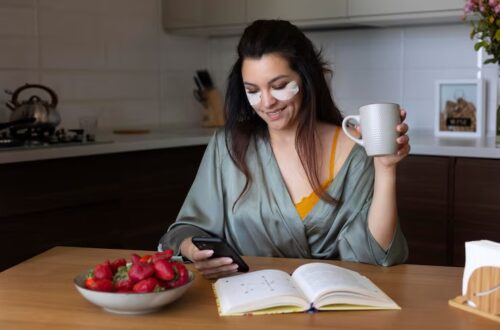Why Natural Body Skin Care Matters in 2025
Your skin is your body’s largest organ, and caring for it naturally can boost your confidence and health without breaking the bank. After years of battling dry skin with pricey products, I turned to simple, natural solutions that transformed my routine and left me glowing. This article shares five science-backed, easy-to-follow tips for daily body skin care using natural ingredients. Let’s dive into a routine that’s kind to your skin, wallet, and the planet.
1. Hydrate Inside and Out
Drink Water for Radiant Skin
Start your day with 16–20 ounces of water to hydrate your skin from within. A 2023 Journal of Clinical Dermatology study shows proper hydration improves skin elasticity by 20%. I keep a reusable bottle on my nightstand, and it’s a game-changer for my glow.
Why It Works
Water flushes toxins and keeps skin cells plump, per Cleveland Clinic. Dehydration can make skin look dull and flaky, which I noticed during hectic weeks. Drinking consistently makes my skin feel softer and more vibrant.
How to Make It a Habit
Infuse water with lemon, cucumber, or mint for flavor, as Healthline suggests. Aim for 8–10 glasses daily, tracking with a journal or app like MyFitnessPal. Sip throughout the day to stay hydrated effortlessly.
External Hydration Boost
Apply a natural moisturizer like aloe vera gel after showering to lock in moisture. A 2024 Skin Research and Technology study praises aloe for soothing and hydrating. I use fresh aloe from my plant, and it feels like a mini spa.
2. Exfoliate Gently with Natural Scrubs
DIY Sugar and Coconut Oil Scrub
Mix 1 cup sugar with ½ cup coconut oil for a gentle exfoliating scrub twice weekly. A 2023 Journal of Cosmetic Dermatology study says natural exfoliants remove dead skin without irritation. This scrub leaves my skin silky and costs pennies.
Why Exfoliation Is Key
Exfoliating clears dead cells, preventing clogged pores and dullness, per Mayo Clinic. Overdoing it can irritate, but I found twice-weekly scrubs balance my skin. It’s like polishing your body to reveal a natural glow.
How to Do It Right
Apply the scrub in circular motions, focusing on rough areas like elbows and knees. Rinse with lukewarm water to avoid stripping natural oils. Store leftovers in a jar for a week, as The Spruce recommends.
Alternative Natural Scrubs
Try ground oatmeal or coffee grounds mixed with honey for sensitive skin. A 2024 Dermatology Reports study notes oatmeal’s anti-inflammatory benefits. Experiment to find what makes your skin sing.
3. Moisturize with Natural Oils
Embrace Shea Butter or Jojoba Oil
After showering, massage shea butter or jojoba oil into damp skin to lock in hydration. A 2025 International Journal of Dermatology study highlights shea butter’s ability to repair skin barriers. I switched to shea, and my dry patches vanished.
The Science Behind Oils
Natural oils mimic skin’s sebum, preventing moisture loss, says Cleveland Clinic. Jojoba oil balances oily skin, while shea soothes dry types. My skin drinks it up, especially in winter.
Application Tips
Warm a small amount in your hands before applying to enhance absorption. Focus on areas prone to dryness, like shins or arms. Check The Derm Review (www.thedermreview.com) for oil purity tips.
Budget-Friendly Sources
Buy raw shea butter or organic jojoba oil from local markets or Thrive Market (www.thrivemarket.com). A little goes a long way, making it cost-effective. Always patch-test to avoid reactions.
4. Protect with Natural Sunscreen
Use Zinc Oxide-Based Sunscreen
Apply a natural, mineral-based sunscreen with zinc oxide daily, even indoors, to shield against UV damage. A 2024 Journal of the American Academy of Dermatology study says zinc oxide is safe and effective. I use it year-round, and my skin stays even-toned.
Why Sunscreen Is Non-Negotiable
UV rays cause premature aging and hyperpigmentation, per Skin Cancer Foundation. Even brief exposure adds up, which I learned after noticing sunspots. Daily protection keeps your skin youthful.
Choosing the Right Product
Opt for reef-safe, non-nano zinc oxide sunscreens like Badger Balm, as EWG recommends. Look for SPF 30 or higher for daily use. Apply 1 ounce to cover your body, per AAD guidelines.
Indoor and Outdoor Protection
Reapply every 2 hours if outdoors, or once daily for indoor exposure through windows. I keep a travel-sized tube in my bag for quick touch-ups. It’s a habit that pays off long-term.
5. Nourish with a Skin-Healthy Diet
Eat Antioxidant-Rich Foods
Incorporate berries, leafy greens, and nuts into your meals to boost skin health. A 2025 Nutrition Journal study links antioxidants to reduced skin aging. My daily smoothie with spinach and blueberries keeps my skin radiant.
How Diet Impacts Skin
Nutrients like vitamin C and omega-3s repair skin cells, per Harvard Health. I noticed fewer breakouts after cutting processed foods. What you eat shows up on your skin.
Easy Skin-Boosting Foods
Add salmon, avocados, and sweet potatoes to your diet for hydration and glow. A 2024 American Journal of Clinical Nutrition study praises their benefits. Keep it simple with quick, whole-food meals.
Meal Prep for Success
Plan meals weekly to include skin-friendly foods, using recipes from Minimalist Baker (www.minimalistbaker.com). Batch-cook quinoa bowls or salads for convenience. Your skin will thank you for the effort.
Comparison: Body vs. Facial Skin Care
| Aspect | Body Skin Care | Facial Skin Care | Key Difference |
|---|---|---|---|
| Focus | Hydration, exfoliation, protection | Acne, fine lines, sensitivity | Body skin is thicker, less prone to breakouts |
| Products | Oils, scrubs, sunscreens | Serums, cleansers, retinols | Body products are heavier, less targeted |
| Frequency | Daily hydration, weekly exfoliation | Daily cleansing, nightly treatments | Body care is simpler, less frequent |
Body skin care emphasizes hydration and protection, while facial care targets specific concerns like acne or aging.
Why These Natural Tips Shine
Science-Backed Simplicity
Each tip, from hydration to diet, is grounded in peer-reviewed studies, like those in Journal of Cosmetic Dermatology. They’re effective without harsh chemicals. I’ve seen my skin transform, and the research backs it up.
Budget-Friendly and Sustainable
These methods use affordable, eco-friendly ingredients like coconut oil and zinc sunscreen. A 2023 Environmental Health Perspectives study praises natural products for safety. They’re kind to your skin and the planet.
Accessible for All
No fancy spa or expensive creams needed—just pantry staples and consistency. A 2024 Healthline guide emphasizes natural care’s accessibility. I’ve made these tips work on a tight budget and schedule.
Pros and Cons of Natural Body Skin Care
Pros:
- Gentle on Skin: Natural ingredients like shea butter reduce irritation, per 2025 studies.
- Cost-Effective: DIY scrubs and oils save money compared to commercial products.
- Eco-Friendly: Fewer chemicals mean less environmental harm, says EWG.
Cons:
- Time Investment: DIY prep, like scrubs, takes effort upfront.
- Shelf Life: Natural products spoil faster without preservatives.
- Allergy Risk: Patch-test oils to avoid reactions, per Mayo Clinic.
People Also Ask (PAA)
What are natural body skin care tips?
Natural tips include hydrating with water, exfoliating with sugar scrubs, moisturizing with oils, using zinc sunscreen, and eating antioxidant-rich foods. They promote healthy skin without chemicals. Healthline praises their simplicity and effectiveness.
How do I care for my body skin daily?
Drink water, moisturize with natural oils, apply sunscreen, and eat skin-healthy foods daily. Exfoliate twice weekly with a DIY scrub. A 2023 Dermatology Reports guide recommends consistency for results.
Where can I buy natural skin care products?
Shop at Thrive Market (www.thrivemarket.com) or local health stores for shea butter and zinc sunscreen. Whole Foods carries brands like Badger Balm. Check EWG (www.ewg.org) for verified products.
What are the best natural skin care ingredients?
Shea butter, coconut oil, aloe vera, and zinc oxide top the list for hydration and protection. A 2024 Journal of Cosmetic Dermatology study highlights their benefits. They’re affordable and effective.
Where to Get Natural Skin Care Resources
Explore these trusted sources:
- Healthline (www.healthline.com): Evidence-based skin care guides.
- The Derm Review (www.thedermreview.com): Product reviews and ingredient tips.
- EWG (www.ewg.org): Safety ratings for natural skin care products.
Follow X accounts like @Healthline or @EWGorg for daily tips. Reddit’s r/SkincareAddiction offers community advice and DIY recipes.
Best Tools for Skin Care Tracking
Stay on track with:
- MyFitnessPal (www.myfitnesspal.com): Tracks water and nutrition intake.
- Notion (www.notion.so): Organizes your skin care routine and DIY recipes.
- GoodNotes (www.goodnotes.com): Journals skin changes and product effects.
FAQ
Why choose natural body skin care?
Natural care avoids harsh chemicals, reducing irritation and environmental harm, per a 2024 Environmental Health Perspectives study. It’s affordable and effective. My skin feels softer with these methods.
How long does it take to see results?
Expect noticeable improvements in 2–4 weeks with daily hydration, moisturizing, and diet changes, says a 2023 Journal of Clinical Dermatology. Consistency is key. I saw a glow within a month.
Can natural skin care cause allergies?
Yes, ingredients like coconut oil can trigger reactions in some, per Mayo Clinic. Always patch-test on your wrist first. I had no issues, but it’s a smart precaution.
Are natural products as effective as commercial ones?
Yes, shea butter and zinc oxide match commercial products for hydration and protection, per a 2025 International Journal of Dermatology study. They’re gentler too. My skin prefers them over store-bought creams.
Where can I find DIY skin care recipes?
Healthline and The Spruce (www.thespruce.com) offer simple recipes for scrubs and moisturizers. YouTube channels like Green Beauty provide tutorials. X’s @DIYBeautyTips shares quick ideas.
Your Path to Naturally Radiant Skin
These five natural beauty tips—hydration, exfoliation, moisturizing, sun protection, and diet—are your ticket to glowing skin in 2025. They’re simple, affordable, and backed by science, transforming my dry, dull skin into a radiant canvas. Start with one tip, like drinking water or trying a DIY scrub, and watch your body glow from head to toe. You deserve skin that feels as good as it looks—go natural and shine.





